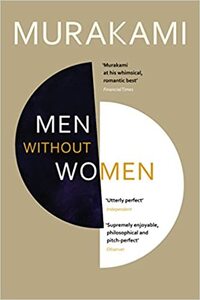Take a photo of a barcode or cover
Classic Murakami, middle age guys have issues with women as the stories get progressively more abstract and absurd. I loved the first half that was more grounded and easy to follow.
Reading Men Without Women felt a bit like déjà vu in literary form. Seven stories, seven men, all without women—either by heartbreak, infidelity, death, or the more abstract concept of “emotional unavailability” Haruki Murakami so loves to swim in. The premise is clear: the absence of women is not just a plot device, but a haunting echo, a vacuum Haruki Murakami spends the entire collection trying to name with his eyes closed. Noble? Maybe. Successful? Not quite.
Let’s talk about these men. Or rather, the man. Because truthfully, it’s the same bloke in different outfits. Haruki Murakami’s favourite loner is back—rebranded, renamed, but no less aloof, emotionally impotent, and inexplicably magnetic to women who will either cheat on him or vanish. I used to find this character mildly compelling, the kind of sad-eyed fellow you’d begrudgingly have sympathy for. This time, I wanted to shake him. Or better yet, hand him a personality and tell him to get a grip.
What really soured it for me, though, was the persistent undercurrent of misogyny. Scratch that—at times it was less “undercurrent” and more tidal wave. Every woman is either a cheating wife, a mysterious enigma, or the root cause of some poor man’s soul-crushing ennui. It’s heartbreak, sure, but heartbreak with a martyr complex. And while I’m no stranger to the emotional wreckage of love lost, it’s a tad rich when every single woman is either unavailable, unattainable, or unforgivably flawed. The men, of course, remain stoic, passive, tragically wounded. Never wrong. Never boring. Never, apparently, the problem.
Take Drive My Car—a story I actually liked until I realised the only woman allowed any agency is deliberately styled as anti-feminine. In Haruki Murakami’s world, it seems a woman can only be powerful if she’s emotionless and dresses like a bloke. Any hint of sexual agency or independence and she’s quickly shuffled into the “destroyer of men” box.
To be fair, the writing itself is still classic Haruki Murakami—crisp, dreamlike, dipped in existential musings. But all that style can’t hide the fact that he’s writing the same emotional man-baby over and over again. And this time, I just didn’t care.
In short, Men Without Women feels less like a meditation on loneliness and more like an exercise in self-pity. I finished the book not moved, but mildly irritated—not at the pain of loss, but at the tired tropes Haruki Murakami refuses to let go of. Maybe it’s time he introduced Women Without Men—though I doubt they’d miss much.
Let’s talk about these men. Or rather, the man. Because truthfully, it’s the same bloke in different outfits. Haruki Murakami’s favourite loner is back—rebranded, renamed, but no less aloof, emotionally impotent, and inexplicably magnetic to women who will either cheat on him or vanish. I used to find this character mildly compelling, the kind of sad-eyed fellow you’d begrudgingly have sympathy for. This time, I wanted to shake him. Or better yet, hand him a personality and tell him to get a grip.
What really soured it for me, though, was the persistent undercurrent of misogyny. Scratch that—at times it was less “undercurrent” and more tidal wave. Every woman is either a cheating wife, a mysterious enigma, or the root cause of some poor man’s soul-crushing ennui. It’s heartbreak, sure, but heartbreak with a martyr complex. And while I’m no stranger to the emotional wreckage of love lost, it’s a tad rich when every single woman is either unavailable, unattainable, or unforgivably flawed. The men, of course, remain stoic, passive, tragically wounded. Never wrong. Never boring. Never, apparently, the problem.
Take Drive My Car—a story I actually liked until I realised the only woman allowed any agency is deliberately styled as anti-feminine. In Haruki Murakami’s world, it seems a woman can only be powerful if she’s emotionless and dresses like a bloke. Any hint of sexual agency or independence and she’s quickly shuffled into the “destroyer of men” box.
To be fair, the writing itself is still classic Haruki Murakami—crisp, dreamlike, dipped in existential musings. But all that style can’t hide the fact that he’s writing the same emotional man-baby over and over again. And this time, I just didn’t care.
In short, Men Without Women feels less like a meditation on loneliness and more like an exercise in self-pity. I finished the book not moved, but mildly irritated—not at the pain of loss, but at the tired tropes Haruki Murakami refuses to let go of. Maybe it’s time he introduced Women Without Men—though I doubt they’d miss much.
drive my car and kino are my absolute favorite short stories
harukumi’s writing is always good but i really never understand why there’s so much sexual stuff involved. but overall easy book to read. my favorite story was kino.
Murakami at his "usual" quirky self, writing about "Men without Women". This collection of 7 short stories represent alternate or ab-normal narratives of men in their aloneness, presenting in each moments the reasons for their state - ranging from the illusion of freedom to the deception of self to the strength of connections whichever the form.
This book gives voice to the multiplicity and diversity of experiences of living, perhaps one we should be reminded in this age.
This book gives voice to the multiplicity and diversity of experiences of living, perhaps one we should be reminded in this age.
+ I always love his short stories, they're easy to read and always calming.
- The depiction of women's qualities in his books isn't always great...
- The depiction of women's qualities in his books isn't always great...
Quick read of what seems to be him experimenting with one single idea from quite a few perspectives. The way the last short, the one that the book gets its name from, is quite special.


